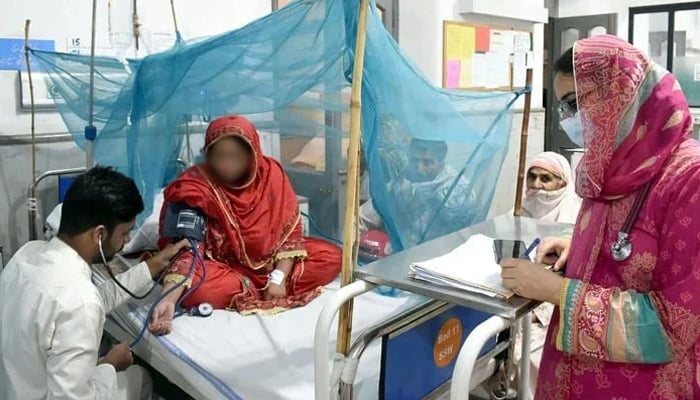Dengue threat looms as winter nears
Islamabad:As the last rains of the monsoon season hit most parts of the country before winter, the Pakistan Meteorological Department has sounded an alarm about possible dengue outbreaks.
It warned that the mosquito-transmitted disease could emerge in major cities, including the federal capital Islamabad and the neighbouring garrison city Rawalpindi, next month. According to a senior PMD official, in light of historical data analysis, current climate conditions, and future outlooks—particularly regarding the retreat of the monsoon—the atmospheric variables discussed are establishing a favourable environment for a spike in dengue fever cases. "The findings show that from mid-September 2024 onward, the environment has become conducive to dengue's onset, with an expected outbreak in October 2024, especially in 10 major cities, including Islamabad, Rawalpindi, Karachi, Lahore, Peshawar, Hyderabad, Faisalabad, Sialkot, Larkana, and Multan, along with regions impacted by post-monsoon rainfall," he told 'The News'.
The meteorologist urged all stakeholders to implement proactive measures against potential dengue outbreaks and said national health agencies and dengue control centres should stay connected with the PMD for weather updates.
The PMD has already forecast substantial rainfall until October 1 throughout the country, with flood warnings for urban regions in Punjab and advisories for possible landslides in upper Khyber Pakhtunkhwa, Murree, Galiyat, Azad Jammu and Kashmir, and Gilgit-Baltistan regions. The rains falling before September 30 in the country are considered to be monsoon rains, with October, November, and December being predominantly dry months. Health experts say dengue outbreaks usually occur during the post-monsoon season, which lasts from September 20 to December 5. Peak mosquito activity occurs two hours after sunrise and two hours before sunset, and breeding stops when temperatures fall below 16°C, according to them. Epidemiologist Dr Najeeb Durrani noted that early December could be considered the end of the dengue epidemic, primarily due to declining temperatures that made it increasingly difficult for the Aedes mosquito to survive and reduce its biting activity.
He said during that time, mosquitoes tended to seek warmer indoor environments to rest. "The last batch of eggs they have laid or are in the process of laying will remain dormant until conditions—specifically temperature and humidity—become favourable again, likely during the following summer months of August to September," he said.
The epidemiologist stressed the need for carrying out awareness campaigns within the community, encouraging residents to take responsibility for eliminating adult mosquitoes through insecticide residual spraying indoors. He also said as a preventive measure against dengue, it was important to identify and eliminate breeding sites where female mosquitoes might have recently laid eggs, such as in solid waste, water tanks, room coolers, old tyres, and open containers with stagnant water.
-
 Horrifying Pictures Of The Kidnapper Of Savannah Guthrie's Mother Released
Horrifying Pictures Of The Kidnapper Of Savannah Guthrie's Mother Released -
 Andrew's Ex-girlfriend Launches Brazen Attack On Epstein Victims On Piers Morgan Show
Andrew's Ex-girlfriend Launches Brazen Attack On Epstein Victims On Piers Morgan Show -
 Andrew Mountbatten-Windsor 'on His Own' As Palace Gives Green Light To Law Enforcement
Andrew Mountbatten-Windsor 'on His Own' As Palace Gives Green Light To Law Enforcement -
 Kanye West's Tweet About Super Bowl Halftime Resurfaced After Bad Bunny's Show
Kanye West's Tweet About Super Bowl Halftime Resurfaced After Bad Bunny's Show -
 'FBI' Star Juliana Aidén Martinez Tease Her Return To 'Law And Order: SVU' After Quitting
'FBI' Star Juliana Aidén Martinez Tease Her Return To 'Law And Order: SVU' After Quitting -
 Cardi B's Emotional Words To Pal Amid Stefon Diggs Rumored Breakup Revealed
Cardi B's Emotional Words To Pal Amid Stefon Diggs Rumored Breakup Revealed -
 Princess Eugenie Breaks Cover Amid Explosive Family Scandal
Princess Eugenie Breaks Cover Amid Explosive Family Scandal -
 Will Kate And Anthony Have 'Bridgerton' Spin Off? Revealed
Will Kate And Anthony Have 'Bridgerton' Spin Off? Revealed -
 Schoolgirl Eaten Alive By Pigs After Brutal Assault By Farmworker
Schoolgirl Eaten Alive By Pigs After Brutal Assault By Farmworker -
 King Charles’ Statement About Epstein Carries A Secret Meaning: Here’s Why It Can Be An Invite To Police
King Charles’ Statement About Epstein Carries A Secret Meaning: Here’s Why It Can Be An Invite To Police -
 Demi Lovato Delivers Heartbreaking Message To Fans About Her Concerts
Demi Lovato Delivers Heartbreaking Message To Fans About Her Concerts -
 Sweden's Princess Sofia Explains Why She Was Named In Epstein Files
Sweden's Princess Sofia Explains Why She Was Named In Epstein Files -
 Activist Shocks Fellow Conservatives: 'Bad Bunny Is Winner'
Activist Shocks Fellow Conservatives: 'Bad Bunny Is Winner' -
 Noel Gallagher Challenges Critics Of Award Win To Face Him In Person
Noel Gallagher Challenges Critics Of Award Win To Face Him In Person -
 Minnesota Man Charged After $350m IRS Tax Scam Exposed
Minnesota Man Charged After $350m IRS Tax Scam Exposed -
 Meghan Markle 'terrified' Over Possible UK Return
Meghan Markle 'terrified' Over Possible UK Return




